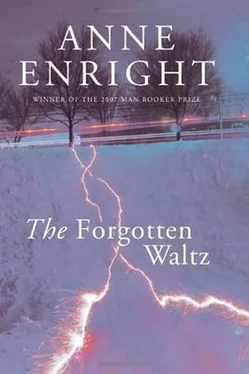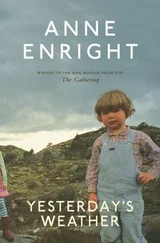‘What are you thinking about?’
‘I don’t know. Nothing much.’
It is fairly clear, however, that he was not thinking about Evie in any practical way, because, when she came up behind him there was a stolen smear of something sticky and very purple on her little face.
He said, ‘Oh for God’s sake, Evie,’ and he sighed. He watched Aileen scrub at the gunk with a paper napkin, then he looked over to me.
Of course, I know Evie’s story mostly from Seán’s point of view, and I know that Seán does not always tell the truth. Or he does not remember the truth. The way he tells it, he met Fiona’s sister (as he used to think of me) for the first time, walking in Knocksink woods, with the kids up to their knees in muck. He has no recollection of me at the party, standing by the fence.
But whatever way he remembers it, there is something in Evie’s story that Seán is constantly trying to understand. Something about himself, perhaps.
And then there is Aileen.
Evie marched into Terenure – quite early on – and handed me a battered-looking envelope, then she rolled her eyes, and clumped off to switch on Joan’s crap little TV. Inside was an information sheet, headed ‘What to Do When Someone has an Epileptic Seizure’. This was clipped to a pathetic note from Aileen – typed, unsigned – that began, ‘When Evie was four years old, she was diagnosed as suffering from benign rolandic epilepsy of childhood (BREC). Recently that diagnosis has been under review.’ I read it all. I didn’t understand a word of it. I said to Seán, ‘So what exactly is wrong with her?’
‘Actually nothing,’ he said. ‘She’s fine.’
Evie, still off the medication, went to school the autumn after the party in Enniskerry, and Aileen had a whole new reality check. The very nice and very young teacher listened to her tale and blinked twice. She said, ‘Could you run that by me again?’ Seán and Aileen then spoke to the headmistress who was completely reassuring. She also reminded them, on their way out the door, that there were twenty-nine other children in Evie’s class.
In October, Evie had a seizure in the line before the bell went, and everyone made a great fuss of her. But there was one little girl who was mean and really, as Evie said to her mother, with all the wisdom a five-year-old can muster, ‘It’s just not me, you know?’
They laughed when she said it, but they were ashamed too. Evie was saying that this might happen inside her, but she was outside it. It was not for her a question of poetry, or personality. It was just a bad thing that happened to her and she wanted it to stop.
They had to admire the person she was, at five years old, and hope she never lost it. Aileen relented. They put her on a different drug which slowly made her fat and, perhaps – again it was hard to tell – a bit incontinent. The seizures stopped. All her loopiness faded away. If anything, she seemed a little dull, though that might have been an illusion of her new girth – and besides, she was growing up. Also out. By the time I saw her in Brittas she was a different person. This time it was Seán who had put the child on a diet – for looking, I suspect, less than middle class . He saw it as a simple balance to her medication, but it is possible that Evie irritated him more, the larger she grew. Because the forbidden ice-pop that day in Brittas had a kind of despair built into it – the way they clung together – both of them hanging on to Evie’s disappearing childhood, there on Fiona’s deck.
That autumn, at Dr Prentice’s suggestion, they tapered the dose, and then, finally, gave it up. Nothing happened.
Evie was absolutely herself – body and mind. She was a little private, perhaps; watchful and solitary. There was, when I met her upstairs on New Year’s Day, a stilled and expectant look, like a child who has known danger, or one who is slightly deaf. She continued free of seizures: her childhood illness was now finished. In a way, it had never been very terrible. She had suffered, the summer of the whipped cream diet, four or five major seizures. Her last was the one in the yard, the year she started school. She did not have another problem until she was ten years old.
And that, so far as I can tell it, is what happened to Evie. But it is not the whole truth. It is just the truth in a concentrated form.
Because, let’s face it – from the day the child was born, Aileen acted as though Evie could die at any moment. What she discovered, when she looked into the baby’s muddy blue eyes, was fear in a form she had never known before. And weaning Evie off her medication was easy compared to weaning her off the breast, for example, which was a major production only slightly less fraught than the three-act opera of getting her on the tit in the first instance.
But though you might think Aileen pushed him away, it is also true, if you do the dates (which I have), if you work the connections and listen to the silences, that Seán had knocked out at least one affair before Evie fell off the swing and battered her little heels on the ground. This is the real way it happens, isn’t it? I mean in the real world there is no one moment when a relationship changes, no clear cause and effect.
Or the effect might be clear, the cause is harder to trace.
The effect walks up, many years later, when you are out to dinner with your new partner and she says, ‘My goodness. Would you look who it is.’
I think his first affair was with the Global Tax woman, the one on the conference in Switzerland. Going by the dates, she was, at a guess, a series of horrible, hot little encounters when Evie was in nappies. The little window in his heart, that opened in Fiona’s kitchen, when she was just pregnant with Jack – that was when Evie was three. So if he talked to Fiona about the sadness of his wife, that day, then maybe his wife had good reason to be sad. Unless she wasn’t sad, of course, and he was just looking for something to say.
Bubblegum girl, as I like to think of her, the one with the nail varnish and the B in Honours Maths, was drinking like a twenty-two-year-old and hanging out of railings around the time I met him in Brittas Bay. I think about his body on the beach, and it seems different to me now. His strong legs and neat back standing at the edge of the sea, while his wife disentangled herself from Evie on the strand: the tufty nipples he covered up with a black T-shirt, while we sat and talked, it all seems, now, differently naked; shadowed by another girl’s touch, wrapped in her secret arms. Cocky little bastard. No wonder he leaned back on his elbows like that and lifted his face to the sky.
I don’t know why I should worry about his infidelities to Aileen especially considering that I was one of them. I should take it as proof that he never loved her, though I think he really did love her once. Did he love my sister that day in Brittas? Or all of these women, all of the time? I don’t care.
He loves me now. Or he loves me too.
Or.
I love him. And that is as much as any of us can know
The Things We Do for Love
THE FIRST THING I hear in the morning is the phone.
‘Are you going into work?’ It is Seán.
‘I think so.’
‘Right,’ he says. ‘Thanks.’
‘Where are you?’ I say, but he is gone.
Neither is he, as I discover when I let the phone fall back on the duvet, in the bed beside me. It is half past eight. There is something too blank about the light outside. I get up into the murk of the room, and pull the curtains of grey linen, and find the world flattened by monochrome.
I do the winter sprint around the freezing room, shower and dress, pick the phone up to find a text:
‘Can you pick Ev up from Foxrock?’
Читать дальше












